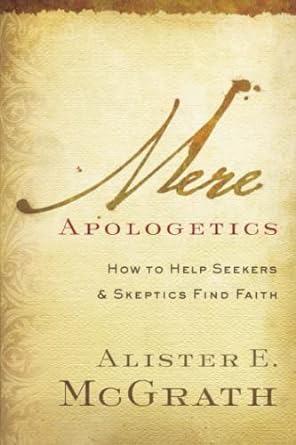A Brief Book Summary from Books At a Glance
by Steve West
About the Author
Alister McGrath is a world-renowned theologian and apologist. In addition to teaching at Oxford and lecturing internationally, McGrath is the author of numerous influential books.
Table of Contents
Introduction
1 Getting Started: What is Apologetics?
2 Apologetics and Contemporary Culture: From Modernity to Postmodernity
3 The Theological Basis of Apologetics
4 The Importance of the Audience: Possibilities and Issues
5 The Reasonableness of the Christian Faith
6 Pointers to Faith: Approaches to Apologetic Engagement
7 Gateways for Apologetics: Opening the Door to Faith
8 Questions about Faith: Developing Approaches
9 Conclusion: Developing Your Own Apologetic Approach
Summary
Chapter 1: Getting Started: What is Apologetics?
It can be exciting to recognize our part in the great community of believers in history who are passing along the faith. However, knowing our own limitations, it can also be intimidating. Thankfully, Christ has promised to be with us and to equip us for a task that is beyond our natural power and wisdom. Explaining, clarifying, communicating, and defending the faith is what the subject of apologetics is about. Apologetics involves giving a reasoned defense or explanation that demonstrates truth or innocence. As Peter wrote, this reasoned defense is to be given with gentleness and respect, so that the demeanor and words of the believer do not contradict the message. The three main tasks of the Christian apologist are defending, commending, and translating. To defend the faith, the apologist needs to understand the specific issues of their audience, and be able to respond to questions that are brought up. Your attitude in these encounters is as important as your analysis. In commending, the apologist tries to show people how the gospel is relevant for them, and why they need Christ. This can involve demonstrating the rationality of the faith, and also by showing that it can satisfy the heart. In translating, we recognize that many people are not familiar with theological terms and biblical concepts, so we communicate them in ways that they can grasp. Apologetics is a consistent and sustained interaction with the ultimate questions of our culture, showing the wonders and glory of Christ.
Whereas apologetics removes obstacles to establishing intellectual consent, evangelism calls people to commitment. If evangelism is an invitation, apologetics clears the way for accepting it. There are of course limitations to apologetics, but it is a tool which works well when applied properly. . . .
[To continue reading this summary, please see below....]The remainder of this article is premium content. Become a member to continue reading.
Already have an account? Sign In
